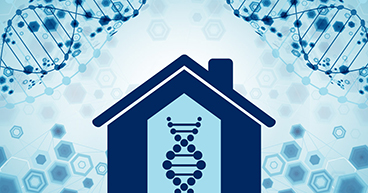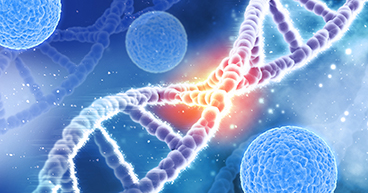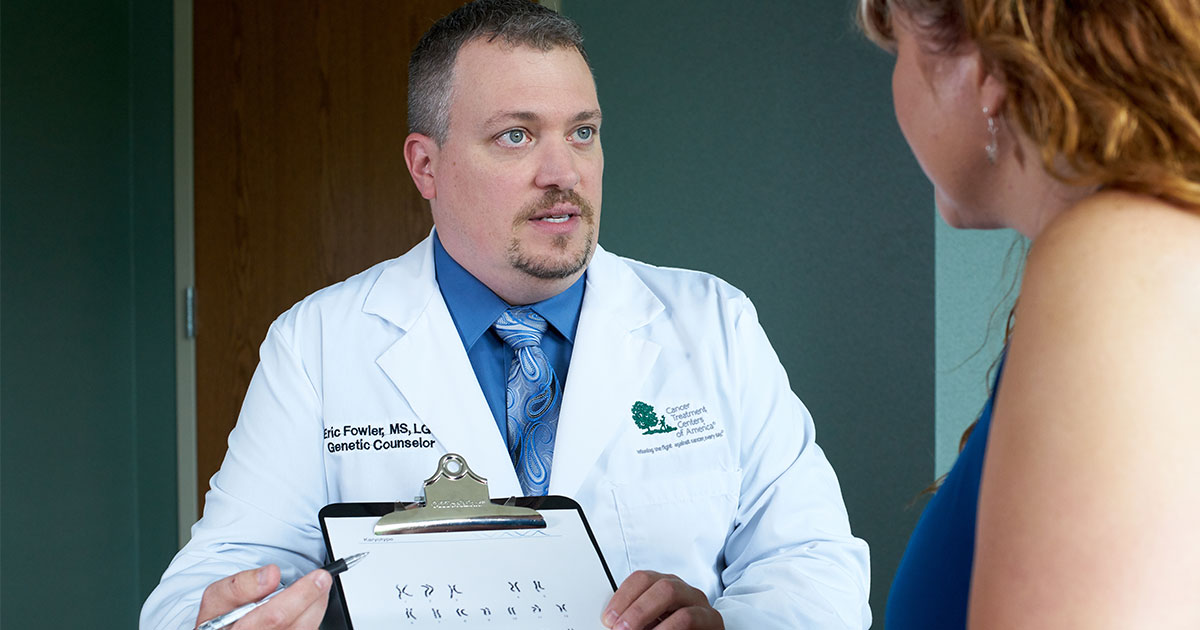
When Angelina Jolie discovered through genetic test results that she inherited the BRCA1 genetic mutation, her decision to have a preventative double mastectomy made headlines in 2013. Her frank message to the public explaining her decision helped increase awareness of the connection between certain genetic mutations and the increased risk of hereditary breast cancer and ovarian cancer. Many women considered what they would do in her shoes.
Approximately 281,550 women will be diagnosed with breast cancer in 2021 in the United States, according to the National Cancer Institute (NCI), making it the second most common cancer (after skin cancer) in women. Approximately 5 to 10 percent of those diagnoses are caused by hereditary factors.
The average woman has an approximately 13 percent chance of developing breast cancer during her lifetime. But if you’re one of the 1 in 500 women who carry a BRCA gene mutation, your lifetime risk rises to about 70 percent. Many women wonder whether genetic testing for breast cancer is something they need or should consider.
Genetic testing looks for an inherited susceptibility or predisposition for cancer. It may identify an increased risk of developing a first or second cancer in a person’s lifetime, but it’s not a guarantee of present or future cancer.
While you can control (to some extent) some risk factors associated with breast cancer, such as lifestyle choices, you can’t control others, like your family history and genetic makeup. Understanding your personal risk for breast cancer, especially when your genes put you at high risk, may help you make more informed decisions about your health care.
Genetic test results aren’t always clear-cut, though, and not everyone qualifies for or would benefit from testing. To help you understand the ins and outs of genetic testing for breast cancer, this article explores these common questions:
- What is genetic testing for breast cancer?
- Who should get genetic testing for breast cancer?
- What are the possible results of a genetic test?
- What are the potential benefits of genetic testing for breast cancer?
- What’s the role of a genetic counselor?
- What else should I consider about genetic testing?
- Where can I get genetic counseling and testing?
If you're interested in talking to someone about genetic testing for breast cancer or in getting a second opinion for breast cancer at Cancer Treatment Centers of America® (CTCA), call us or chat online with a member of our team.
What is genetic testing for breast cancer?
Genetic testing uses healthy cells obtained from a blood or saliva test. We study the DNA of the cells to look for inherited changes or differences, also called mutations, that we know prevent the gene from doing the job it’s supposed to do, which is to repair damage to DNA.
As we go through life, we’re exposed to harmful elements in the environment, like chemicals, pesticides and radiation. These exposures (as well as certain lifestyle habits) can damage our cellular DNA.
When cells divide in our bodies, the DNA is copied. When it’s copied correctly, the copy is identical to the original. But sometimes, errors happen during this process. The job of some genes is to repair those errors when they occur.
We've learned that in some people, and in some families, one of these genes isn’t able to repair DNA damage the way it’s supposed to, and this malfunctioning gene is passed down from generation to generation. Anyone who has this type of genetic mutation has a higher-than-average risk for certain types of cancer associated with that mutation.
Get a personalized nutrition plan tailored to your genetic profile.
Genetic mutations linked to a higher risk of breast cancer
Scientists studying cancer genetics continue to find and evaluate inherited mutations that may increase a family’s cancer susceptibility.
The inherited genes most commonly tested because of their association with an increased risk of breast cancer include:
BRCA1: Between 55 percent to 72 percent of women who inherit the BRCA1 genetic mutation will develop breast cancer during their lifetime, according to the NCI. These same women have a 39 percent to 44 percent chance of developing ovarian cancer, compared to approximately 1.2 percent of women in the general population.
BRCA2: Between 45 percent to 69 percent of women who inherit the BRCA2 genetic mutation will develop breast cancer in their lifetime. Their risk of developing ovarian cancer ranges from 11 percent to 17 percent.
Women with BRCA1 and/or BRCA2 mutations are also at increased risk for pancreatic cancer.
Men who inherit one of these BRCA genetic mutations are at higher risk of developing male breast cancer, as well as pancreatic cancer and prostate cancer.
CHEK2: About 1 percent of people carry this mutation. It’s more common than the BRCA mutations, but the risk of developing a cancer associated with it is lower. A woman with a mutation in the CHEK2 gene has a 23 to 48 percent lifetime risk of developing a first breast cancer and a 29 percent chance of developing a second breast cancer within 10 years of the first.
Having this mutation is also associated with a higher risk of colon cancer.
Other genes that may be tested because of their potential influence on breast cancer development include, but are not limited to, PALB2, PTEN and TP53.
Who qualifies for genetic testing for breast cancer?
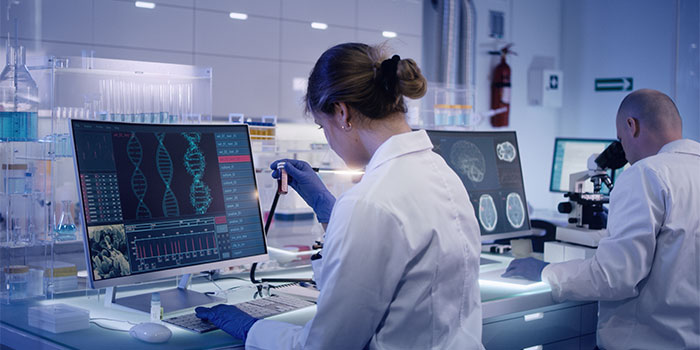
Organizations such as the National Comprehensive Cancer Network (NCCN) and the U.S. Preventive Services Task Force outline criteria for who should be considered for genetic testing for breast cancer.
Guidelines focus on those who have a higher likelihood of carrying one of the harmful gene mutations associated with breast cancer. Examples include:
- Being diagnosed with breast cancer before the age of 45 or being diagnosed with triple-negative breast cancer before age 60
- Having a close family member diagnosed with breast cancer at age 50 or younger
- Having a close family member diagnosed with a cancer linked to an inherited risk for breast cancer, such as ovarian cancer or pancreatic cancer
- Having two close family members diagnosed with breast cancer, one of whom was diagnosed at age 50 or younger
- Having three or more relatives on the same side of the family diagnosed with breast cancer at any age
- Having a family history of breast, ovarian or pancreatic cancer and being of Ashkenazi Jewish descent (About 1 in 40 women of this ancestry carry the BRCA1 or BRCA2 gene mutation.)
What are the possible results of a genetic test?
Patients are sometimes disappointed to find that the results of genetic testing may not be clear and may not provide the answers they’re looking for. Possible test results and what they mean include:
- Positive: A positive test result means we found an inherited risk for cancer.
- Negative: A negative test result means we found no differences in any of the genes that we looked at.
- Inconclusive: An inconclusive test result means we found a genetic difference that’s unclear. This result may also be called a variant of uncertain significance. This means we're not sure whether the difference we found could contribute to the development of cancer.
When someone tests negative for a known mutation in their family, this is called a true negative test result. The vast majority of people with true negative test results are at average risk for cancer.
Sometimes negative and inconclusive results are referred to as uninformative results, meaning the genetic testing did not provide an explanation for the personal or family history of cancer. This means we found a difference in a gene, but its impact on that gene's function, and therefore the risk for cancer, is unknown.
An uninformative result may be especially frustrating when there’s a strong family history of cancer. Keep in mind, though, that there may be genetic mutations that haven't yet been discovered or linked to a specific cancer’s development. Clusters of cancer in a family may also result from environmental exposure or shared lifestyle factors.
When genetic testing doesn’t find clear answers, I recommend that people check back in with me or another genetic counselor every few years to see whether any major improvements have been developed in testing that would be applicable to them based on their personal histories and/or their family histories. We're constantly finding new genes in the field of cancer genetics, and the test methods are being improved and made more accurate.
What are the potential benefits of genetic testing for breast cancer?
When patients come to me for genetic counseling at CTCA®, most want to know how genetic testing might benefit them and/or their family members.
Genetic testing informs us about the risk of developing a future cancer, but results may also be useful in guiding cancer screening decisions, in taking risk-reducing measures and in treatment decisions for those who’ve already been diagnosed with cancer.
With or without a cancer diagnosis, test results may help a person and his or her family members understand their risk of developing certain future cancers and allow them the opportunity to take steps to reduce their risk or to be more proactive about cancer screening.
For example, patients who know they have a mutation may consider more frequent screening than they otherwise would. Their medical team may consider using breast MRIs in addition to mammograms for follow-up screening.
Some women with a BRCA mutation decide to have risk-reducing surgery, such as a mastectomy, to lower their risk of breast cancer. Knowing that having this mutation also means a higher risk of ovarian cancer, some decide to undergo surgery to remove their ovaries and fallopian tubes.
If we find someone has an inherited risk, we can use the genetic testing results to narrow down the search for the same mutations in the DNA of other family members.
It’s somewhat like locating a person’s home. Once you have the address, you can find that person much easier.
How genetic test results may influence treatment decisions
If you’ve already been diagnosed with breast cancer, genetic test results may identify the reason for your cancer and influence treatment decisions, such as which surgical procedure or what kind of follow-up is recommended (and how often).
Some patients are confident about their surgical and other treatment decisions regardless of what genetic testing shows. Others use genetic testing to guide their treatment plan.
When it comes to breast surgery, for example, some patients who know they have a higher chance of developing a second breast cancer decide to have more extensive surgery, such as a mastectomy or a double mastectomy. Conversely, when others discover they don’t have a BRCA or other mutation, they sometimes decide to have a lumpectomy to remove the tumor instead of a double mastectomy to remove both breasts.
Knowing this information prior to surgery may help some people make a decision they wouldn’t otherwise have made, or it may allow them to make a decision with more confidence.
The results of genetic testing sometimes allow the oncologist to consider other treatments, such as targeted therapy and different types of chemotherapy, that may not otherwise have been an option.
What’s the role of a genetic counselor?
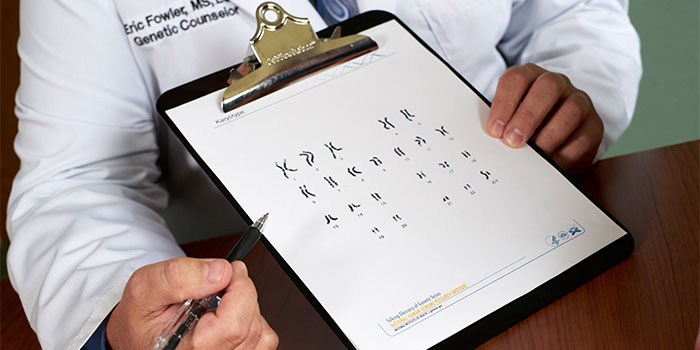
Most people are referred to a genetic counselor by their physician or an advanced practitioner, such as a physician’s assistant or a nurse practitioner.
Genetic counselors don’t recommend testing. Our role is to perform a breast cancer risk assessment and review the reasons people may or may not be interested in genetic counseling to empower them to make a decision that’s right for them.
During pre-test counseling, genetic counselors:
- Discuss genetics and the connection to cancer
- Review your personal and family history information to assess the likelihood that genetic testing may find an inherited risk
- Prepare you for what genetic testing may or may not find and the potential consequences of the results
- Review reasons people may decline genetic testing
Should you choose to go ahead with genetic testing, we discuss your results and their potential consequences during a post-testing counseling session.
If we find a mutation, we discuss your options, according to the medical guidelines for that specific mutation, to help you determine your next steps. If you’re a patient at CTCA, we work with your medical team to outline the guidelines to be considered going forward.
What else should I consider before getting genetic testing?
Working with a genetic counselor before making a decision may help you explore other, often-unanticipated consequences associated with genetic testing.
Emotional impact
Finding out you have an increased risk of cancer may cause stress and anxiety. It can sometimes change family relationships. Some may experience survivor guilt when they learn they didn’t inherit the risk but family members they love did. Other times, those who inherited the risk wonder, “Why me?”
Potential discrimination
People sometimes wonder whether discovering an increased risk of cancer could affect their future and lead to discrimination when it comes to employability and obtaining life or health insurance coverage.
The federal law, Genetic Information Nondiscrimination Act (GINA) of 2008, prohibits genetic discrimination by health insurers and in the workplace, but the law doesn’t extend to life insurance, disability or long-term care.
What genetic testing can’t tell us
Genetic test results can’t tell us whether you have cancer at the moment of testing or whether you’ll ever develop it.
The results can’t tell whether you’re at risk for conditions that aren’t being tested, such heart disease, diabetes or stroke. Right now, most genetic testing is focused on a particular area of medicine. So when we coordinate genetic tests for people in the oncology setting, it's only to look for inherited risks for cancer. We currently don’t have a test that's widely available to screen for all health conditions.
Where to go for genetic counseling and testing
Most health insurance companies cover testing when it’s considered medically necessary or medically reasonable, based on the guidelines. Some physicians order genetic testing for their patients with or without a referral to genetic counseling. It varies by physician and institution. Ask your doctor about the possibility of getting a referral to a genetic counselor for an in-depth risk assessment and to explore the option of genetic testing.
If your physician is unable to refer you to a genetic counselor, you can search for a certified genetic counselor on the Finding a Certified Genetic Counselor page of the American Board of Genetic Counseling website.
Direct-to-consumer genetic tests are also available. Some of the major testing laboratories currently charge about $250 for those choosing to self-pay. But be sure to research this option thoroughly to clearly understand what you should expect from this kind of testing. Direct-to-consumer genetic tests typically don’t evaluate inherited cancer risk as thoroughly as a test ordered by a medical provider, and results often need to be confirmed at a second laboratory.
Genetic counselors must be licensed in the state where the patient lives. At CTCA, we have licensed counselors in almost every state where genetic counseling licensure is required. This allows us to provide counseling to the majority of patients in the United States, and it also gives us the option to conduct telehealth consultations for genetic counseling in addition to in-person visits. (You don’t have to be a patient at CTCA to use our services.)
CTCA is a cancer center where we only treat cancer. Our oncologists and multidisciplinary cancer experts are familiar with genetic testing and its implications in all stages of cancer and its treatment. We offer genetic counseling to our patients who are referred for genetic testing, and we’re often able to meet with them quickly.
Everyone’s situation is unique when it comes to cancer and cancer treatment, including the decision of whether to get genetic testing. If you have concerns about a family history of breast cancer, a genetic counselor can help assess your family and medical history to determine whether your personal risk factors warrant genetic testing.
If you’re interested in talking to someone about genetic testing for breast cancer or in getting a second opinion for breast cancer, call us or chat online with a member of our team.

